PRINCETON, NJ -- Americans' first reactions to the news of President Obama's nomination of Judge Sonia Sotomayor to serve on the U.S. Supreme Court are decidedly more positive than negative, with 47% rating the nomination as "excellent" or "good," 20% rating it "only fair," and 13% rating it "poor."
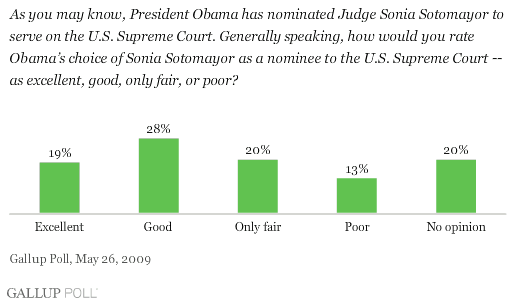
These results are based on a one-night poll conducted Tuesday, the same day Obama officially announced Sotomayor as his choice to replace the retiring Justice David Souter on the Supreme Court.
ÆéûÜǨû§conducted similar reaction polls immediately after former President George W. Bush's nominations of John Roberts, Samuel Alito, and Harriet Miers for the Supreme Court in 2005. Although in all instances, the reactions were more positive than negative, the net positive rating (the percentage excellent or good minus the percentage only fair or poor) was highest for Roberts and Sotomayor, and lowest for Alito and Miers.
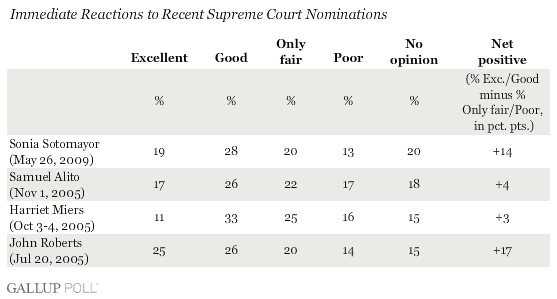
Given that Sotomayor's nomination was made by a Democratic president, it is not surprising to find reactions to her selection that are much more positive among Democrats than among Republicans.
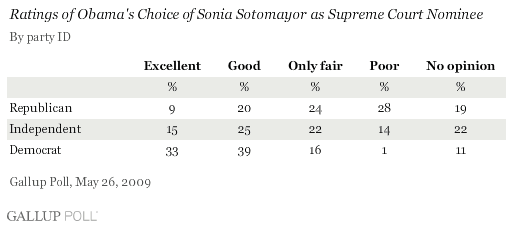
Comparing ratings of Sotomayor to those of the three previous nominees (all chosen by the Republican President Bush) suggests that the current partisan reaction to Sotomayor follows a fairly standard pattern. Between 72% and 79% of those identifying with the party of the president making the nomination react positively to the candidates. There is a slightly larger range in positive ratings among those identifying with the party not controlling the White House at the time of the nomination: from a high of 31% of Democrats who supported Roberts and 29% of Republicans who support Sotomayor, to a low of 18% of Democrats who supported Alito.
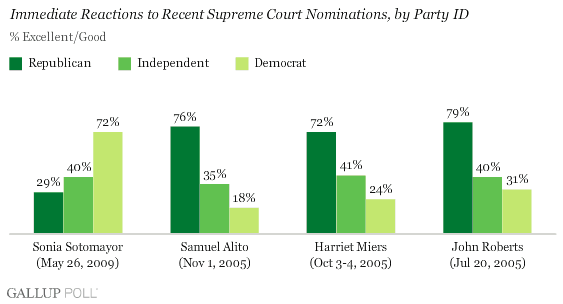
There are two primary reasons why Sotomayor's nomination could in theory appeal to women:
- She would become the second female justice on the Court.
- She has been nominated by a Democratic president at a time when women are significantly more likely to identify with his party than with the Republican Party.
Indeed, the data show a significant gender skew in reaction to Sotomayor's appointment.
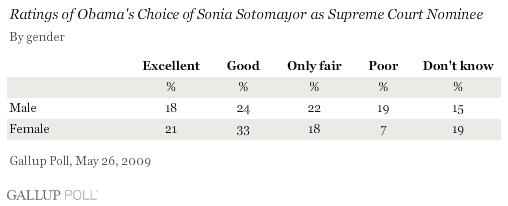
Interestingly, the gender gap in positive reactions to Sotomayor is the largest such gap for the four most recent Supreme Court nominations -- in either direction. Alito had higher approval among men than among women (by eight points), but both Miers and Roberts had essentially the same level of positive reactions across genders.
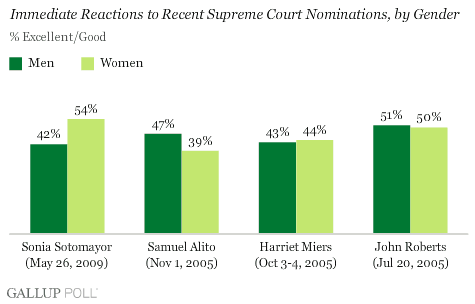
Much of the discussion about Obama's nomination decision has focused on his clear intent to appoint a woman, given the fact that there is currently only one female justice on the Court. Additionally, it has been widely noted that Sotomayor would be the first Hispanic on the Court if she is confirmed by the Senate.
Still, it appears Americans believe that Sotomayor's intellectual credentials and experience were more important to Obama in his decision to nominate her than were her demographic characteristics.
The May 26 ÆéûÜǨû§Poll asked Americans for their perceptions of the importance of five of Sotomayor's characteristics in Obama's thinking when he decided to nominate her. The public downgrades the perceived importance to Obama of Sotomayor's gender and ethnicity; only 39% and 34%, respectively, call these very important to him. Instead, majorities believe that he heavily valued her experience as a federal judge (61%), her intellect (59%), and her views and judicial record (52%).
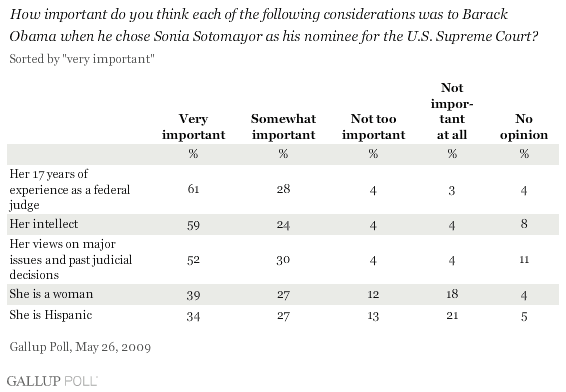
Survey Methods
Results are based on telephone interviews with 1,015 national adults, aged 18 and older, conducted May 26, 2009. For results based on the total sample of national adults, one can say with 95% confidence that the maximum margin of sampling error is ôÝ3 percentage points.
Interviews are conducted with respondents on land-line telephones (for respondents with a land-line telephone) and cellular phones (for respondents who are cell-phone only).
In addition to sampling error, question wording and practical difficulties in conducting surveys can introduce error or bias into the findings of public opinion polls.
Polls conducted entirely in one day, such as this one, are subject to additional error or bias not found in polls conducted over several days.
